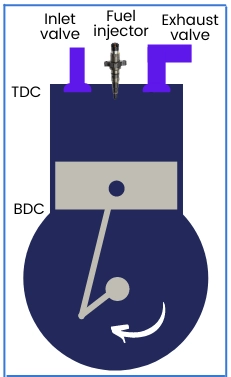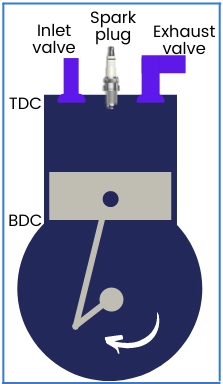The diesel engine differs from the gasoline engine in various aspects like compression ratio, operating pressure, ignition mode, efficiency initial cost, maintenance cost, etc.
Before starting comparing let’s discuss both of them in brief.
Contents:
Diesel engine:

Diesel engine works on the principle of the diesel cycle and it is also known as a compressed ignition engine. This engine operates at higher pressure as it uses a higher compression ratio. The charge inside of the engine is auto-ignited because of the rise in temperature.
The diesel engine used a fuel injector for injecting fuel inside of the cylinder. This type of engine is generally used in heavy-duty vehicles.
Gasoline engine:

The gasoline engine runs on the principle of the otto cycle and it is also known as SI engine as the air-fuel mixture inside of the engine is ignited by using the spark plug. Mostly the gasoline engine uses the carburetor for atomization of the air and fuel.
The recent gasoline engine uses fuel injectors that help to mix the fuel in the intake manifold. The gasoline engine is mostly used in lightweight applications like two-wheelers, cars, etc.
Here is how a diesel engine differs from a gasoline engine:
1) Method of ignition: In a diesel engine, the air-fuel mixture undergoes auto-ignition due to the increased temperature of compressed air. While in the case of a gasoline engine the air-fuel mixture is ignited by the spark plug.
2) Compression Ratio: The diesel engine requires a higher compression ratio from 14.1 to 22.1 while the gasoline has a compression ratio from 10.1 to 14.1.
3) Operating Cycle: The diesel engine works on the diesel cycle while the gasoline cycle works on the principle of the otto cycle.
4) Spark Plug: The diesel engine doesn’t require the spark plug but in the case of a gasoline engine the spark plug is necessary for the combustion of the air-fuel mixture.
5) Fuel: the diesel engine requires diesel as fuel while the gasoline engine requires petrol or CNG as a fuel.
6) Fuel atomization: In a diesel engine, the fuel is directly spread inside of the engine cylinder while in the case of a gasoline engine the fuel is mixed inside the carburetor.
7) Initial Cost: The initial cost of the diesel engine is comparatively higher than the gasoline engine.
8) Maintenance Cost: The diesel engine requires much maintenance as it operates at higher pressure while the maintenance cost of the gasoline engine is comparatively lower.
9) Efficiency: The diesel engine is considered as comparatively more efficient than the gasoline engine.
10) Application: Diesel engines are mostly used in heavy-duty vehicles like buses, trucks, and earthmovers while the gasoline engine is used in light-weight vehicles like bikes, cars, scooters, etc.
Conclusion
The diesel engine is different from a gasoline engine in case of the type of ignition, compression ratio, fuel, efficiency, etc. It has some advantages over the gasoline engine and also has some disadvantages which make it different from a gasoline engine.